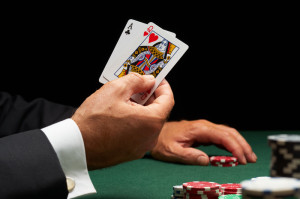Legalization of Gambling

The legality or otherwise of internet gambling in the United States has frequently been as unclear as the smoke-filled backroom games that online poker wishes to replace. In its early years, internet gambling was supposedly governed by the 1961 Federal Wire Act, a rarely used piece of legislation making it illegal to place bets using telecommunications networks that crossed state or national borders. It remained a point of debate whether or not this legislation could be stretched to cover internet betting, and the issue was never properly tested in a court of law. Changes started to occur in 2006, though. This was the year in which the US government passed the SAFE Port Act. This legislation was actually designed to strengthen anti-terrorism measures. However, a last minute amendment to the act (and one which went largely unread and unnoticed by those passing it) smuggled in the anti-gambling legislation known as the Unlawful Internet Gambling Enforcement Act, or UIGEA.
Exactly what UIGEA said is still being debated today. Effectively, it prevented banks from knowingly processing transactions that would be used for gambling. It also seemed to strengthen the case against site operators. However, the poorly written legislation was so loose in its definitions that it wasn’t clear exactly what was legal and what wasn’t. Horse racing seemed to be exempted. But what about ‘skill-based’ games, like Poker? On one reading of the Act, these also seemed to be exempt. And then there was the way in which the legislation seemed to apply only to ‘unlawful’ online gambling. Washington and Utah were the only states to specifically make online poker illegal, for instance, so did this mean that poker sites could continue to operate legally in other states?
UIGEA and the Backlash
While a number of big poker operators (Party Poker, Paradise Poker, 888 amongst others) were keen not to chance their arm, and departed the US market immediately upon the passing of UIGEA, others were less willing to surrender meekly. Indeed, the large void left (particularly by Party Poker) allowed the likes of PokerStars and Full Tilt Poker to grab huge market share, building healthy player numbers through the use of clever promotions and stunts. PokerStars, in particular, were adamant that their legal case was strong, and that UIGEA could have little effect on their own business. However, it was becoming increasingly hard for gaming companies to find financial firms who would allow players to deposit money with them. Many credit card companies and banks had dropped out immediately. PayPal hadn’t been processing payments to gambling sites since 2003, and Neteller would also close its doors to US gambling transactions after a run-in with the authorities in 2007.
The final blow seemed to come in March 2011, on what has come to be termed ‘Black Friday’, as the Justice Department took action against PokerStars, Full Tilt and Absolute Poker, seizing money and freezing the accounts of players across the globe. PokerStars agreed to pay a sum to avoid further action and promptly exited the US market. Full Tilt and Absolute Poker struggled with liquidity problems, and Full Tilt would itself be taken over by its rival, PokerStars. Many players had their money frozen for a sizeable period, and the public slating of Full Tilt as a ‘Ponzi scheme’ continues to colour its reputation today. PokerStars would persist in protesting from its Isle of Man foreign base, but ultimately, the battle seemed to have been won. Or had it?
A New Beginning
Strangely, it would be the resurfacing of an old friend, the 1961 Federal Wire Act, that would threaten to blow open the entire market, just as it seemed to have been placed neatly in an iron locker at the bottom of the Atlantic. And it was the Justice Department that would light the touch paper, ruling that the 1961 Act only, in fact, applied to sports betting, and that non-sports betting would be acceptable provided it was handled within state borders. Once again, this opened up the question of whether internet poker (and other casino games) would be permitted, particularly if individual states specifically legalized online gambling?
Interested parties were quick to start testing the boundaries. Nevada, Delaware and New Jersey were the first states to legalize online gambling, and a number of licenses should have been issued to companies within these areas by the end of 2013. Those are small states, though, so there is a question about whether there currently are enough players to create a healthy marketplace. Other states are expected to follow shortly, and if one of those, as expected, turns out to be the behemoth California, the sudden rush of new players could turn a gentle current into a tidal wave.
With Morgan Stanley predicting that the market could be worth $9.3 billion by 2020, it’s perhaps unsurprising that cash-strapped local governments are eyeing up a portion of this money for themselves – New Jersey governor Chris Christie was quick to demand that the suggested state tax on online gambling be raised from 10 to 15%. It seems almost certain, too, that the federal government will wish to have its share some time soon. Probably not just yet, but at some point in the next few years, it seems probable that we’ll see the passing of one of the many bills proposing the legalization of online gaming. That would allow for a national body that can oversee internet gambling, and ensure that customers are protected, and that the young and vulnerable are largely left alone. It would also help the government to a portion of the industry’s potential goldmine.
So what, exactly, was achieved by the UIGEA? Was it in fact an elaborate scheme to flush out the ‘foreign-based’ firms at the expense of US-based ones, and to give state and national government the opportunity of controlling its own section of this international market? In a sign of things to come, PokerStars has quickly snapped up Atlantic Club Casino Hotel in New Jersey with a view to relaunching its US operations. This could yet turn into a vicious turf battle for real estate – both physical and online. However brutal the competition gets, US poker and casino players will be hoping that the red carpet is soon rolled out for them, and that the land of the free can once more become the home of the high roller.

